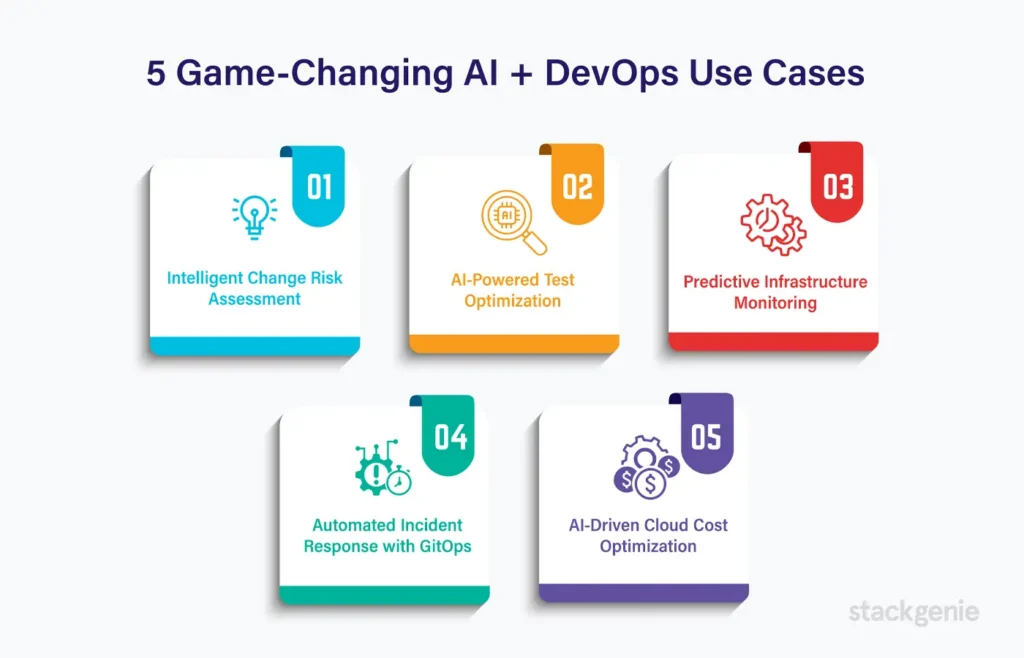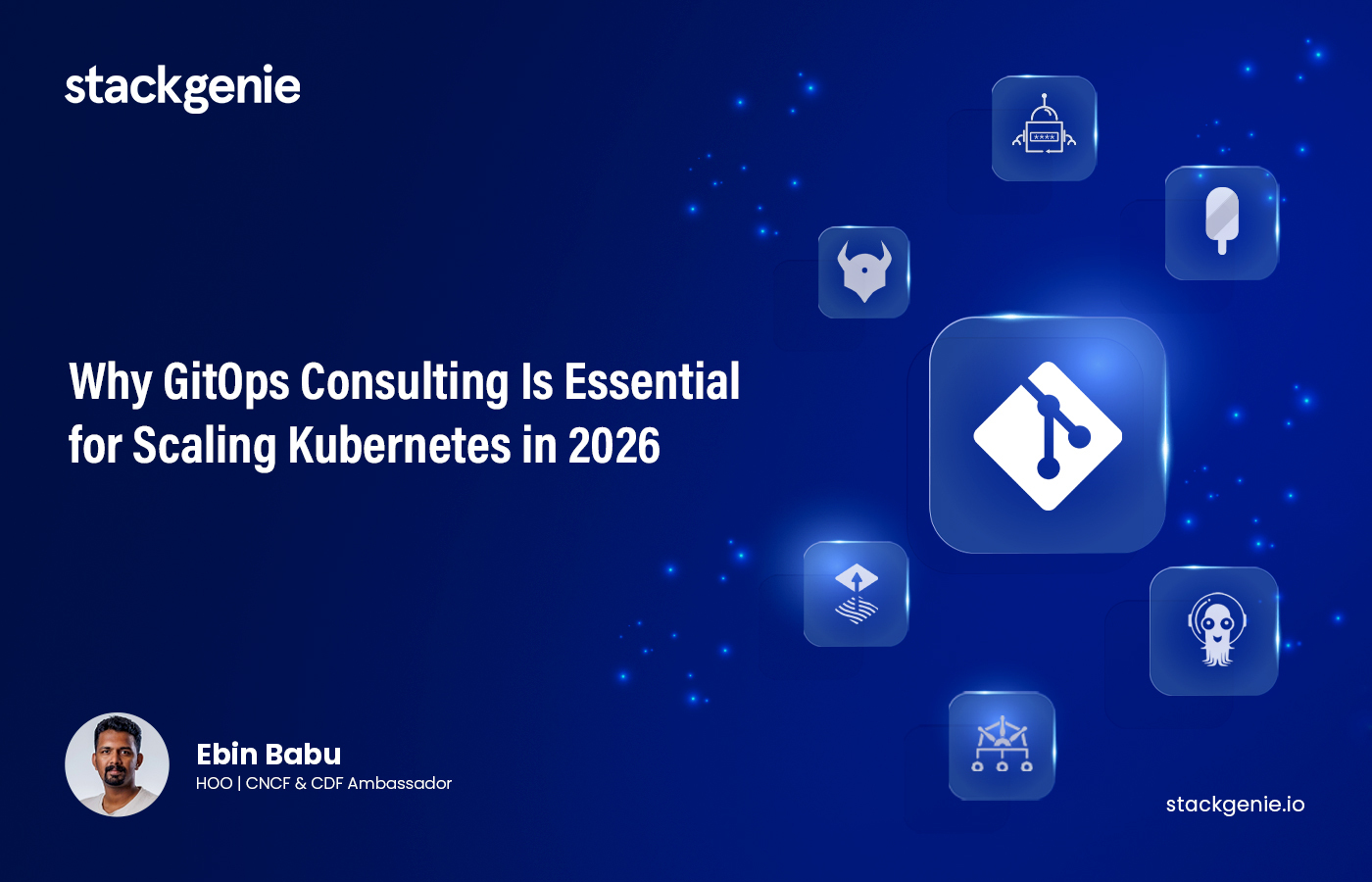Inside this article :
Enterprise teams are drowning in operational complexity. with Kubernetes clusters spanning multiple clouds deploying applications and services from inefficient CI/CD pipelinesdelaying rollouts, and your on-call engineers spending nights firefighting
The solution isn’t more tools—it’s intelligent operations powered by AI. With the recent emergence of AI, enterprises are opening up to the possibilities to considering it for addressing the many challenges they face in managing Kubernetes platforms and environments at scale. This comprehensive guide reveals how leading organizations combine kubernetes expertise with AI-driven automation to achieve 40% faster deployments, 30% lower infrastructure costs, and dramatically improved system reliability.
Why AI + DevOps Matters in 2025
The platform engineering landscape has evolved beyond basic containerization. Today’s competitive advantage comes from intelligent, self-optimizing systems that learn from your operational data and automate complex decision-making.
The Reality Check: 65% of organizations are managing costs through automation of manual processes, with containerization and CI/CD following closely at 62% and 61% respectively. The teams winning in 2025 combine this automation with AI-powered patterns that compress feedback loops and eliminate toil.
Here’s what intelligent DevOps delivers:
- Velocity: AI-prioritized test selection cuts CI time by 50% while maintaining quality
- Reliability: Predictive anomaly detection prevents incidents before they impact customers
- Efficiency: Automated cost optimization identifies $50K+ monthly savings opportunities
- Scale: DevOps automation that grow with your engineering team
5 Game-Changing AI + DevOps Use Cases

1. Intelligent Change Risk Assessment
Stop breaking production with “simple” Friday deployments. AI-powered risk scoring analyzes your historical failures, code patterns, and test coverage to predict which changes need extra scrutiny.
Example Implementation
yaml
# GitOps workflow with AI risk gates
steps:
– name: ai–risk–assessment
uses: platform/risk–score@v1
– name: intelligent–gates
run: |
if [ “$(cat risk.json | jq .score)” > “0.7” ]; then
echo “High-risk: Expanding test matrix”
echo “require_senior_review=true” >> $GITHUB_OUTPUT
fi
Result: 40% fewer production incidents from risky deployments.
2. AI-Powered Test Optimization
Your test suite shouldn’t run everything every time. Intelligent DevOps automation analyze which tests historically catch issues for specific change types, dramatically reducing CI feedback loops.
Implementation of AI-powered test optimization would requireconfiguring test selection models that understand your codebase architecture, reducing CI time by 20-60% without missing critical defects.
3.Predictive Infrastructure Monitoring
Transform noisy alerts into actionable intelligence. AI-powered anomaly detection learns your system baselines and only alerts when anomalies correlate with actual business impact.
Example Implementation
yaml
# Prometheus + AI anomaly correlation
alert: IntelligentIncidentDetection
expr: anomaly_score{service=”checkout”} > 0.9
and rate(http_errors_total{service=”checkout”}[5m]) > 0.05
for: 10m
A major requirement here is to ensure that your monitoring strategy integrates seamlessly with your existing observability stack.
4. Automated Incident Response with GitOps
For well-understood failure patterns, let AI prepare the fix as a GitOps PR instead of waking up engineers at 3 AM.
GitOps Implementation of Incident Response Automation will Include:
- Automated runbook execution through pull requests
- Human approval workflows for all infrastructure changes
- Complete audit trails linking incidents to resolutions
- Integration with existing change management processes
5. AI-Driven Cloud Cost Optimization
Stop playing whack-a-mole with your AWS bill. AI analyzes usage patterns across your entire infrastructure and surfaces specific optimization opportunities.
Questions Your AI System Answers:
- “Which workloads should migrate to Spot instances for maximum savings?”
- “What’s our optimal Reserved Instance strategy for Q2?”
- “Which Kubernetes clusters are over-provisioned and by how much?”
Executing an AI powered cloud cost optimization ensures that the recommendations align with your specific SLOs and business requirements.
Example AI powered Observability Reference Architecture
Core Technology Stack
Observability Foundation: Prometheus, OpenTelemetry, structured logging with correlation IDs
AI/ML Layer: Anomaly detection models, embeddings store for historical correlation, LLM gateway with enterprise controls
Automation Engine: GitOps (Argo CD/Flux) as the single source of truth for all infrastructure changes
Integration Layer: Chat bots, dashboard overlays, and audit systems.
Security & Compliance Guardrails
- Data minimization: Process only the telemetry slices needed for analysis
- PII protection: Automated scrubbing before any external processing
- Human oversight: All infrastructure changes require explicit approval
- Audit completeness: Full traceability from AI recommendation to business outcome
Getting Started with AI + DevOps
The competitive advantage in 2025 belongs to engineering organizations that successfully blend artificial intelligence with expert operational practices. The technology is proven, the patterns are established, and the ROI is measurable.
The question isn’t whether to implement AI in your DevOps—it’s whether to do it right the first time.
Ensuring your AI implementation scales securely, integrates seamlessly, and delivers measurable business outcomes from day one, coupled with existing DevOps automation to accelerate your journey from reactive operations to predictive, self-optimizing systems.
Are you exploring relevant uses case for introducing AI in your existing DevSecOps ecosystem and transform your platform team into a business outcome-driven engineering organization? Let’s talk
Stackgenie specializes in AI-powered DevOps transformations through expert kubernetes service consulting, comprehensive DevOps automation services, professional cloud infrastructure consulting, and production-ready GitOps implementation services. Our certified consultants have deployed these patterns at scale across Fortune 500 enterprises.


